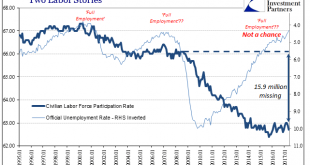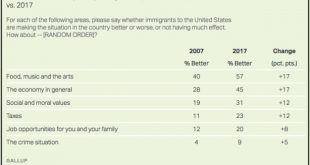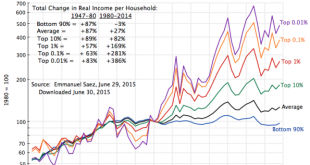from Norbert Häring My book in German with the translated title: “Brave New Money: PayPal, WeChat, Amazon Go – A Totalitarian World Currency in the Making” has just been published by Campus. I have tanslated the “Introduction and Overview” and part of Chapter 1. I will publish this translation in two parts over the next few days. This is part 1. The future of payments has arrived in early 2018, when the first Amazon Go store opened its gates for the general public in Seattle. If you shop...
Read More »USA official unemployment rate: the missing 15.9 million
Source: https://www.marketslant.com/article/next-crisis-not-our-lifetimes-yellen-62717
Read More »The United States is not on the brink of a financial crisis
from Dean Baker Prior to the collapse of the housing bubble and the resulting financial crisis, major news outlets had little interest in pieces warning about the bubble and the risks it posed to the economy. These days there seems to be a large demand for such pieces. Unfortunately, in choosing these pieces, news outlets seem little better informed today than they were in the years before the housing bubble collapse. To take a recent example, the New York Times published a piece by...
Read More »Econophysics
from Lars Syll Unfortunately, nothing is more dangerous than dogmas donned with scientific feathers. The current crisis might offer an excellent occasion for a paradigm change, previously called for by prominent economists like John Maynard Keynes, Alan Kirman and Steve Keen. They have forcefully highlighted the shortcomings and contradictions of the classical economictheory, but progress has been slow. The task looks so formidable that some economists argue that it is better to stick...
Read More »Tear down that wall!
from David Ruccio American capitalists love immigration. So, as it turns out, should American workers. The last time I addressed the issue of immigration, I made the argument that recent waves of immigration have benefited a tiny group of employers at the top, who in turn have managed to shift the costs—through wage reductions and higher taxes—onto workers (both recent immigrants and native-born workers). In fact, just a couple of weeks ago, American corporate titans used a collegial...
Read More »Mainstream economics and the state
from June Sekera In standard economics scripting, government is most often cast in the role of bumbler or villain. Whether as market fixer, intervenor, enforcer or redistributor, its actions are portrayed as resulting in “distortion,” “inefficiency,” “deadweight loss,” and worse. Three quarters of a century ago, Paul Studenski rejected such casting. He found government to be a vital figure whose role was not simply to intervene or redistribute. Government was a producer. A professor of...
Read More »“I never learned maths, so I had to think”
from Lars Syll Professors may find themselves ill-prepared for the macro classroom. To become academics they had to answer erudite questions posed by more senior members of the discipline. To become good teachers of introductory macro, they have to give clear answers to muddled students. That requires an intuitive feel for the subject. It is not enough to crank through the equations. Indeed, Mr Rowe attributes part of his success as a teacher to his shortcomings as a mathematician. He...
Read More »Income redistribution in the United States
Share of wealth in the United States
Source: http://politicsthatwork.com/graphs/share-of-wealth Source: http://gabriel-zucman.eu/uswealth/
Read More »Easterlin’s paradox or why economic growth does not make us happier
from Lars Syll In Easterlin’s (1974) seminal paper, he finds that within any one country, in cross sectional studies, there was a strong correlation between income and happiness. One would easily conclude that money can buy happiness. However, looking at a cross section of countries, one comes to a different conclusion … For 10 of the 14 countries surveyed, the happiness ranking is about the same, even though the income per capita changes by a factor of 30 from $140 to $2,000 … The...
Read More » Real-World Economics Review
Real-World Economics Review







